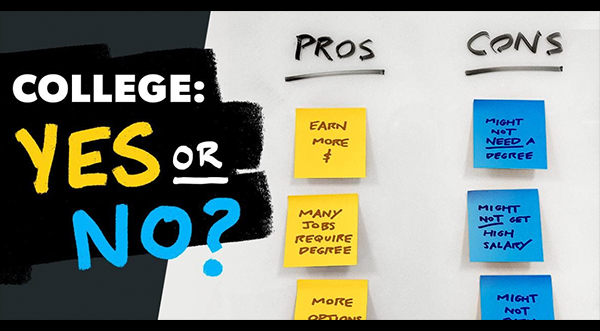Pros and Cons of Attending College
By Space Coast Daily // May 20, 2021

High school students have been repeatedly seen grapple with the question of whether or not college education is necessary for them.
The solution to this issue is usually convoluted since quite a lot of aspects have to be considered before arriving at an informed decision. Every single student is unique and has different visions in his or her life.
Though colleges expose students to certain opportunities of life, aspects such as cost of acquiring college education and inadequacy of white collar jobs have seen many high school students either shun or abandon college education. However, a closer examination of the pros and cons of acquiring college education could lead to a more satisfactory answer.
Discussing the advantages and disadvantages of higher education

Students are surely at the best position to establish if college education can add any value into their lives. However, they should be given the pros and cons and other information needed on college education to help them make such paramount decisions in their life. College education has several benefits, including the wide array of alternatives offered to the student in the workplace.
Students who undertake college education acquire certain qualifications that enable them to become competent in the outside world. The first opinion about you comes from your resume.
In such cases, students and graduates can use the resume service. Some of the students also get great lucrative opportunities all because of acquiring college education. The most vital achievement of going to college is maybe the fact that college imparts its students how to become all-round; college graduates get out with better educational and social skills.
However, college education has its dark side. College education has become a lucrative business among quite a number of higher learning institutions and for this reason; college fees have become unreasonably pricey.
Moreover, specific plans to fund needy students are not adequate. College education sometimes becomes a waste of talent since students don’t always pursue what they want as a result of the highly competitive nature of college vacancies; some students also end up nurturing their skills on their own and starting up business premises other than getting employed.
Working and Studying
Draut analysis serves as an eye opener to many college students who are doing part time jobs besides learning. However, in some situations, it is because of circumstances and not her own making.
If a student comes from a humble background, it is hard to raise fees for college education. In addition, even if a student gets an education loan from the government, it does not cover all the expenses.
Over time, the student finds it hand to cope up with college life without money (Roen p 168). The only solution left is to work alongside attending school. If you are looking for a job, you can use a linkedin profile writer service.
Draut’s analysis also points on student’s performance in the long run. It hurts to see students who were admitted in universities with good grades graduating with poor grades that cannot even allow them a place in the job market.

Draut is trying to prove that, unless something is done, colleges will only be producing quacks and not professionals. It is extremely difficult to work and at the same time attend lectures.
The result is that, students opt to work at the expense of their studying time. Equally important to note is that, the long working hours on top of college education is to blame for many college drop outs today (Roen p 170).
On the flip side, the number of students who are earning bachelors has remained stagnant for the same reasons. Draut analysis should also serve as a warning to the society and especially the government and parents.
Parents should work hard to give their children all what they need to study comfortably. It should not be that the student is straining to get money for school fees. The government should offer loans which are comfortable to pay and one that caters for all the expenses.
Conclusion
In conclusion, college education’s is relevance to individuals depends on several aspects: students’ abilities and talent; affordability and college opportunities likely to be helpful to an individual. These aspects should be the guiding principles when a student is deciding whether or not to pursue college education.











